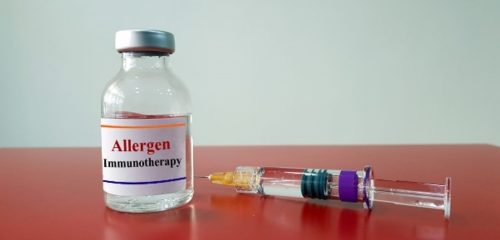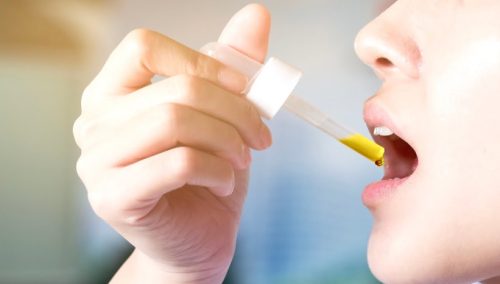Allergy shots can reduce your reaction to allergens (what you are allergic to), which can result in fewer or less severe symptoms.

Why are allergy shots done?
Subcutaneous immunotherapy is the best established form of treatment for allergies.
– Subcutaneous (under the skin, between the skin and muscle).
– Immunotherapy (allergy shot treatment).
Allergy shots may be a good treatment choice if:
– Medications don’t control your allergy symptoms well, and you can’t avoid the things that cause your allergic reactions.
– Allergy medications interact with other medications you need to take or cause unwanted side effects.
– You want to reduce your long-term use of allergy medication.
– If you’re allergic to insect stings.
Allergy shots are indicated for the management of the following:
* Allergic rhinitis, with or without allergic conjunctivitis, including:
-Seasonal allergic rhinitis/conjunctivitis
-Perennial allergic rhinitis/conjunctivitis
-Both seasonal and perennial allergic rhinitis/conjunctivitis
* Allergic asthma:
-Seasonal allergic asthma
-Perennial allergic asthma
How is it done?
– You must first have skin testing to find out which allergen you are allergic to. This is done after a referral is sent to an immunologist/allergist.
– When immunotherapy is done in the form of allergy shots, a health care professional injects small doses of substances that you are allergic to. This helps your body get accustomed to the allergen, which can result in fewer or less severe symptoms.
– Allergy shots contain just enough allergens to stimulate your immune system but not enough to cause a full-blown allergic reaction.
– Your health care professional injects under your skin a solution of salt water (saline) that contains a very small amount of the allergen(s). At first, you get the shot once or twice a week. You gradually receive more of the allergen in the shots.
– After about 4 to 6 months of weekly shots, you are usually getting the best amount of allergen in the shot. This is called the maintenance dose. When you reach the maintenance dose, you get the same dose in shots every 1-4 weeks.
– After 1 year of maintenance, your allergist will check to see if you have fewer or less severe symptoms. If your allergy symptoms have not changed, you will no longer get the shots. If your symptoms have improved, you may continue to get monthly shots for up to 3 to 5 years.

Risk?
You receive allergy shots in a medical office and you will stay in the office for 30 minutes after you get the shots, in case you have a severe reaction to the injected allergens.
Anaphylaxis is a rare but severe reaction to immunotherapy. Symptoms of include: blood pressure drops suddenly and the airways narrow, blocking breathing. Signs and symptoms include a rapid, weak pulse; a skin rash, flushed and pale skin, hives, itching; and nausea and vomiting; weakness and fainting.
The staff at the clinic is prepared to treat severe reactions if they occur.
Redness and warmth at the shot site are common. But these go away after a short period of time.
What are the differences between allergy symptoms and cold symptoms?
The difference between colds and allergies is that viruses cause colds, while particulate antigens such as pollen or dust mites cause allergies.
You know you have a cold when your symptoms peak and go away within a week or two. On the other hand, pollen allergies occur seasonally when a particular plant is pollinating and can last much longer.
How are allergy injections done at Sina Medical Clinic?
– Our registered nurse will administer the allergy injections for you
– You do not have to wait to see a doctor.
– You can book appointments with the nurse in advance.
Are there alternatives to injections?

Our naturopathic doctor, Miranda Wiley, does allergy testing and can prescribe sublingual allergy drops. The allergy testing fee is $70.00.
Similar to allergy shots, sublingual allergy drops treatment usually lasts between 3-5 years.
They are convenient. You can take the allergy drops wherever you go and can be self-administered. They are a good alternative to those who do not like injections.
The different types of allergies sublingual immunotherapy can treat are: inhalant/environmental allergies, food allergies, and pre-seasonal allergies.
References:
https://www.healthlinkbc.ca/illnesses-conditions/allergies/allergy-shots-allergic-rhinitis
https://www.mayoclinic.org/diseases-conditions/anaphylaxis/symptoms-causes/syc-20351468#:~:text=Anaphylaxis%20causes%20the%20immune%20system,rash%3B%20and%20nausea%20and%20vomiting
https://www.vchri.ca/stories/2018/04/02/ask-expert-how-can-i-stop-allergies-taking-over-my-life-spring
https://www.mayoclinic.org/tests-procedures/allergy-shots/about/pac-20392876#:~:text=Allergy%20shots%20are%20regular%20injections,that%20trigger%20your%20allergic%20reactions.
https://www.uptodate.com/contents/subcutaneous-immunotherapy-scit-for-allergic-disease-indications-and-efficacy?search=allergy%20shots&source=search_result&selectedTitle=1~57&usage_type=default&display_rank=1
Photo References:
https://www.osfhealthcare.org/blog/allergy-shots-can-bring-you-long-term-relief/
https://molekule.science/the-science-behind-allergy-immunotherapy-shots/
https://atlantaallergydoctor.com/blog/allergy-drops-what-is-sublingual-immunotherapy/
